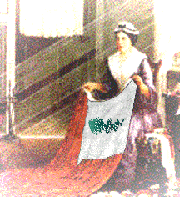 |
TODAY Thursday 19 February 1998 Each weekday. Conn Nugent on what's new in the world, on the site. |
newsroom
 |
TODAY Thursday 19 February 1998 Each weekday. Conn Nugent on what's new in the world, on the site. |
TODAY IN THE WORLD: The Trouble With Cattle
We all know good people who think that the single most important act that an individual can undertake on behalf of the environment is to abstain from red meat, from beef in particular. They reason that demand for beef causes deforestation in the tropics and waste, pollution, and cruelty in the north. They're not wrong, exactly, but it is a little complicated.
Certain parts of the planet have co-evolved with hoofed herbivores. Savannas, prairies, steppes. Americans can look to the Great Plains, where scores of millions of bison became -- like grasses and fire and rain -- part of a vast ecosystem. Settlers from the young United States plowed up most of the prairie and nearly eliminated the bison. But there are still parts of the Great Plains where you can see the native prairie (other than renting "Dances with Wolves"). The best places I know are in the Flint Hills in east central Kansas. They're called the Flint Hills because the rocks are close to the surface of these rolling upswells. The layer of topsoil is too thin to make plowing worthwhile; hence they've been saved. Such places require grazing grass-eaters to function in their natural state. The ecologically-minded ranchers who produce the T-bones from the Flint Hills Cattlemen Association (call Pete Ferrell, 316-843-1888) are doing God's own work. (Unless you believe that God doesn't want us to kill animals, in which case you'll get no argument.)
Two things make Pete Ferrell's steak different from the steak in your grocer's meat case: Pete's taste better, and Pete's come from animals raised in an untypical way. Pete's animals mostly eat what's on the Flint Hills, and so move around a lot. He tries to minimize doses of antibiotics and other medicines. But most American beef cattle today are penned in giant "confinement facilities" and are fed with grains, a wide spectrum of drugs, and sometimes feed supplements made from ground-up cousins (the source of Europe's mad-cow problems). One of these confinement animals requires many more acres of grain per year than a vegetarian human would, and so contribute disproportionately to the overall ag problems of soil erosion and pesticide leaching. Their amalgamated manure fouls groundwater and streams.
Pete Ferrell's Flint Hills operation is also different from typical new cattle ranches in the developing countries. (India has the world's largest herd, by the way, followed by Brazil and then China.) There cows and steers still graze for most of their food, but on land that was recently forested. Most of the losses to the Amazonian rainforest are new cattle pastures. The soils of tropical forests usually produce grasses of a poorer quality than those found in temperate zones. Cows forage more to produce less milk and meat.
And in doing so, they belch and fart a good deal, and thereby emit methane, a gas which traps heat in the atmosphere 25 times more efficiently than carbon dioxide. According to a report in yesterday's Environmental News Network, cattle emit 100 million tons of methane each year, and the figure is growing. Cows are a big part of climate change anxieties.
ENN reports that Australian researchers have demonstrated that cattle fed on grains emit much less gas than cattle grazing on tropical pastures. "We found cattle on a forage diet produced four and a half times as much methane for every kilo gain in liveweight as cattle on a high-quality grain-based diet," said the team leader. "This research indicates it is possible not only to reduce methane emissions from ruminant animals such as cattle and goats in the tropics, but at the same time to increase total food protein output, and so improve the diets of millions of people."
The "high-quality grain-based diet" will have to be produced somewhere, of course, which gets us back to the problems of agriculture and agricultural expansion into forestlands. So here's a dilemma for us, the best answer to which -- buy only from Pete Ferrell in Beaumont, Kansas -- has only limited application.
TODAY ON THE SITE
Don't forget to go to our High Fives section for your course in Eco Ag 101. We offer two excellent authorities -- Chuck Hassebrook and Hal Hamilton -- who can steer you straight to the best internet resources for agriculture in general and sustainable agriculture in particular.
Recent "Today" columns:
2/18: Optimistic Feds and the Future of Kyoto
2/17: The New Great Game
2/13: Windmills
2/12: Stuart Eizenstat's Smart Bomb
2/11: Alligator in the Coal Mine
2/10: Inconvenient Public Opinion
2/9: Remember Penn Station
2/6: Adam Smith and Automobile Efficiency
2/5: Clean Water, Naturally
2/4: Roll, Storms, Roll
2/3: Land Purchase Fever
2/2: Groundhog Day in the Persian Gulf
1/30: Trees and Hormones
1/29: Things To Come (2)
1/28: Things To Come
1/27: 'Bye, 'Bye Brazil
1/26: Jaywalking and Jaydriving
1/23: Good Biotech, Bad Biotech
1/22: No More Roads
1/21: Swordfish
To access more "Today" columns, click "Archives" below.